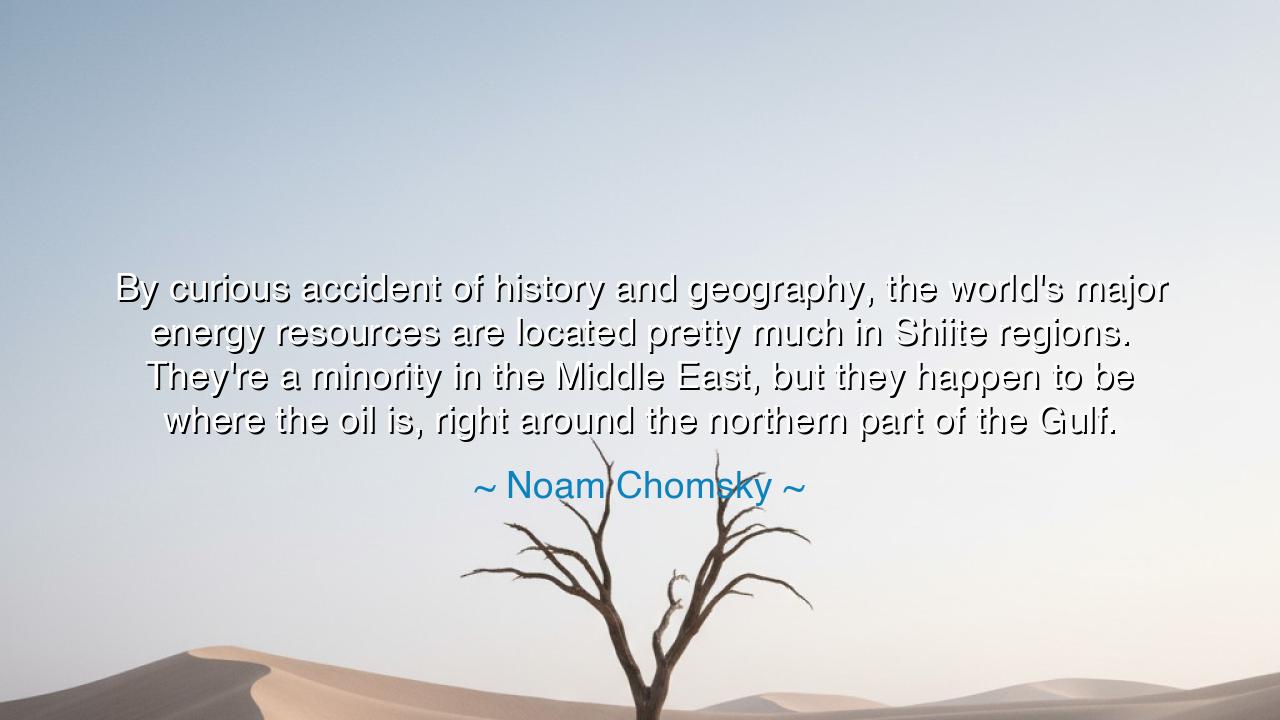
By curious accident of history and geography, the world's major
By curious accident of history and geography, the world's major energy resources are located pretty much in Shiite regions. They're a minority in the Middle East, but they happen to be where the oil is, right around the northern part of the Gulf.






“By curious accident of history and geography, the world's major energy resources are located pretty much in Shiite regions. They're a minority in the Middle East, but they happen to be where the oil is, right around the northern part of the Gulf.” Thus spoke Noam Chomsky, the philosopher of politics and conscience, whose words cut through illusion like a blade through mist. In this reflection, he reveals not merely a fact of geography, but a truth about the fragile balance of power that shapes the world. For in the meeting of history and geography, fate has placed the greatest treasures of modern civilization — the black rivers of oil — in the hands of a people often oppressed and overlooked, the Shiite communities of the Middle East. This “curious accident,” as Chomsky calls it, is not mere coincidence but the root of centuries of conflict, ambition, and manipulation.
The meaning of this quote lies not only in its observation of where the world’s energy lies, but in what humanity has done because of it. For when something of immense value is confined to a small region — especially one inhabited by those without political power — the forces of empire awaken. They come cloaked in diplomacy, in trade, in promises of freedom or stability, yet beneath all lies the hunger for control. Chomsky, ever the chronicler of empire, reminds us that the placement of resources has shaped the destinies of peoples more than any decree of kings or prophets. The accident of oil’s geography has become the design of human greed, and the deserts that hold it have known little peace since.
Consider, for example, the lands that border the Persian Gulf — Iran, Iraq, and parts of Saudi Arabia — the heart of this “Shiite crescent.” Within their soil lies a large portion of the world’s oil, lifeblood of modern civilization. But those same lands have been the battlegrounds of endless war and intrigue. In the 20th century, foreign powers carved lines upon the sand, creating borders to divide rather than unite, to ensure that control over these resources would remain uncertain — and thus exploitable. The Iran–Iraq War, the Gulf Wars, the ceaseless turmoil of the region — all bear the imprint of this geography. Behind each conflict, Chomsky suggests, lies the hidden truth that where the oil flows, so too flows the struggle for dominance.
And yet, he names this alignment of faith and resource as a “curious accident”, not an act of destiny. For nature is impartial; it scatters its gifts without regard for politics or religion. The earth does not choose who will rule or who will suffer — it simply gives. It is mankind that wraps these gifts in the machinery of greed and violence. The Shiite peoples, though a minority in the Middle East, have found themselves standing upon land that the world covets. Thus, they are made both powerful and vulnerable, honored in word yet often crushed in deed. This irony — that those least dominant politically should dwell above such wealth — is the cruel poetry of history.
From this “accident” unfolds a lesson as ancient as empire itself: that what we call fortune may in truth be a burden, and that wealth, if not guarded with wisdom, invites ruin. The same pattern has echoed throughout time. Recall the golden lands of Africa, whose minerals and diamonds drew colonizers from across the sea; or the ancient Spice Islands, whose fragrant bounty fueled centuries of conquest. Everywhere that nature placed treasure, men came bearing flags and guns. The oil of the Gulf is only the latest chapter in this long, tragic saga — a reminder that humanity, though gifted with abundance, has yet to master its own desire.
Yet Chomsky’s words are not only condemnation; they are also awakening. He calls upon us to look beyond the surface of maps and headlines, to see the deeper currents of power and exploitation that shape the world we inherit. The boundaries of nations and the divisions of faith are not merely cultural accidents — they have been sharpened and maintained by those who profit from disunity. If people understood this truth — if they saw that the same forces exploit them all — they might resist the endless cycle of manipulation and war. The oil beneath the earth could then become not a curse, but a blessing shared among peoples.
So, my child of the future, take heed of Chomsky’s wisdom. Do not mistake accidents of geography for destiny. Learn to see through the veils of politics to the structure of power beneath. Remember that every war for resource is also a war upon the soul of humanity — a test of whether we will serve greed or justice. The earth’s gifts are vast, but they are not infinite. Let them teach you humility. Let them remind you that true wealth lies not in the oil of the ground, but in the wisdom of restraint and the courage of truth. For history, if it has taught us anything, is this: those who worship resource will always fall, but those who seek understanding will rise beyond it — and endure.






AAdministratorAdministrator
Welcome, honored guests. Please leave a comment, we will respond soon